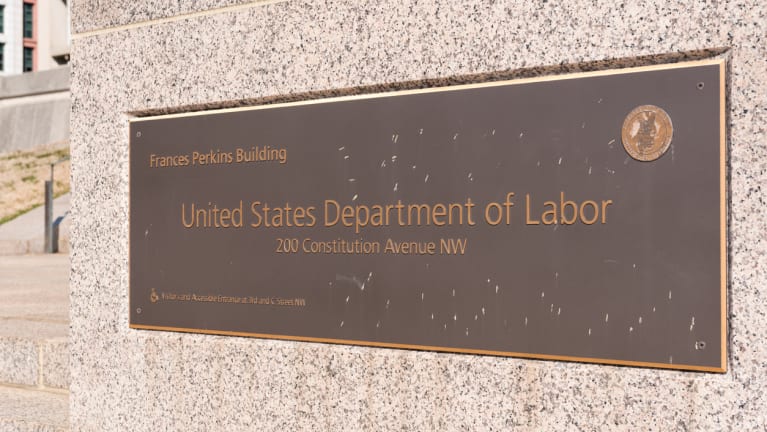
By Allen Smith, J.D. | November 30, 2020
Employers are preparing for changes the U.S. Department of Labor (DOL) may make under President-elect Joe Biden's administration. From joint-employer issues to Office of Federal Contract Compliance Programs (OFCCP) and Occupational Safety and Health Administration (OSHA) action, the DOL is likely to shift direction on many fronts.
Michael Lotito, an attorney with Littler in San Francisco and co-chair of Littler's Workplace Policy Institute, discussed likely changes at the department with SHRM Online. Lotito has testified before the U.S. House of Representatives and the U.S. Senate, as well as the National Labor Relations Board and the Equal Employment Opportunity Commission. He also co-founded the Emma Coalition, a project named in honor of his granddaughter and dedicated to preparing American businesses for displacement of employees that the rapid rise in automation and artificial intelligence is expected to bring.
SHRM Online: Might the Biden DOL reissue joint-employer guidance and, if so, how might this be significant from a practical standpoint?
Lotito: The DOL joint-employer rule under President Donald Trump's administration was challenged by 18 state attorneys general in a federal court in New York. The district judge held the rule to be invalid. The case is on appeal. Littler has intervened on behalf of the International Franchise Association and other associations to protect the rule. The new administration might attempt to have the Department of Justice, which is litigating the case for the DOL, change its position as to whether the rule should be upheld. The case may likely go to the U.S. Supreme Court.
In the meantime, the DOL may attempt to pause any effectiveness of the rule while it considers its options. Doing so will risk litigation against DOL, as Administrative Procedure Act rulemaking requirements will become operative. The fight then to confirm the rule will play out in court and often over complex administrative law questions.
However, the field personnel of DOL may well take a much more aggressive enforcement posture against companies in applying the rule to a set of facts. This, too, will invite even more litigation.
SHRM Online: How might a Biden DOL advance unions' interests, such as if large infrastructure projects move forward?
Lotito: Biden proudly says he is a union man and wants to be a union president. One way of demonstrating sincerity in that regard will be through federal contractors who will bid on infrastructure projects. He is likely, through executive orders, to impose requirements on contractors similar to the previously issued and nullified "blacklisting rules." Neutrality, card check, no record of unfair labor practices, strict adherence to Davis-Bacon Act rules and more will possibly impose on contractors a huge price to pay for the privilege of working for the government.
SHRM Online: Do you expect any significant changes at the Wage and Hour Division, and, if so, what might those be?
Lotito: I expect the Wage and Hour Division will stop issuing opinion letters, which have been helpful to many in the regulated community during the Trump administration. A potential review of the joint-employer and upcoming independent-contractor rule will be high up on the division's agenda. Perhaps the division will revisit overtime standards and issue rules dealing with pay entitlement for off-the-clock work, like checking e-mail from home. Enforcement will be aggressive, especially against certain industries like fast food, janitorial, construction and other targets. The department will also coordinate with state DOLs to cooperate with one another as investigations progress.
SHRM Online: What shifts in priorities will the OFCCP likely make under the Biden administration?
Lotito: The OFCCP will have to deal with the executive order from President Trump concerning diversity training guidelines. I suspect President-elect Biden will nullify it. In any event, diversity and inclusion are enormously important issues for everyone and particularly government contractors. More rigorous enforcement efforts, including in-depth audits, will once again become the norm. Controversy over pay disparity issues will intensify.
SHRM Online: What steps might OSHA take in the Biden administration?
Lotito: First, the new president will move quickly to appoint and have confirmed an undersecretary of OSHA, a position that has been vacant over the past four years. That person will move swiftly to promulgate an emergency temporary standard applicable to the pandemic for all impacted stakeholders. Regular new standards will evolve as the pandemic continues and ultimately subsides. Strict enforcement will be the rule of the day. OSHA will be one of the busiest government agencies so long as the pandemic persists.
SHRM Online: What legislative changes might a Biden DOL seek to lead?
Lotito: Legislative changes will depend largely on the results of the Georgia Senate contests. But even if the Senate is 50/50 with Vice President-elect Kamala Harris breaking all ties in likely favor of progressives, legislative initiative may be minimal. A 50/50 Senate will not eliminate the filibuster as Sen. Joe Manchin, D-W.Va., has said recently he is not in favor of the filibuster's removal. As long as one needs 60 votes to approve legislation in the Senate, controversial matters on labor and employment like the Protecting the Right to Organize Act, paid sick leave, a new minimum wage and the like may not be front and center as Biden deals with COVID-19, taxes and infrastructure.
SHRM Online: How should employers prepare to respond to these possible changes?
Lotito: First and foremost, be comfortable with uncertainty. Increase compliance focus. Stay engaged and informed. Elections have consequences. How this plays out will depend on many factors. But if the Biden Administration really wants to be remembered for workplace initiatives, it should embrace a new GI bill for upskilling the workforce of the 21st century. We are in the midst of the most transformative workplace disruption in history given the pandemic, robotics and artificial intelligence.
***** ***** ***** ***** *****
Source: Society for Human Resource Management (SHRM)
https://www.shrm.org/resourcesandtools/legal-and-compliance/employment-law/pages/dol-priorities-will-change.aspx
